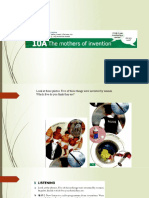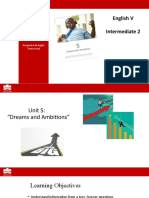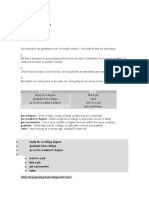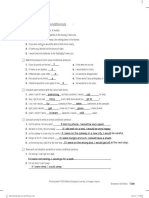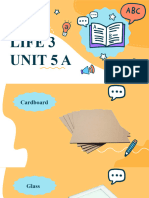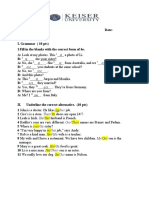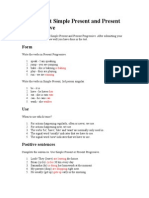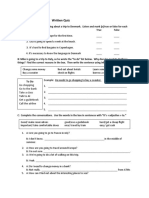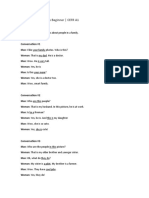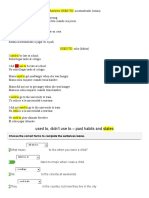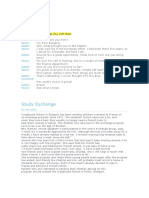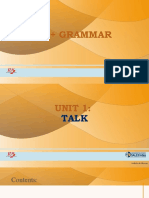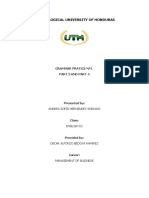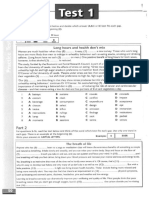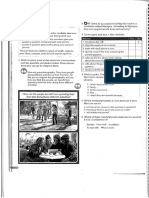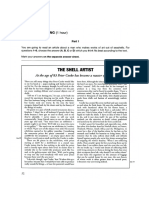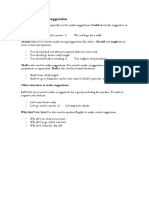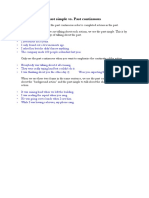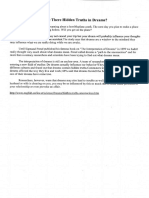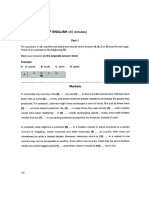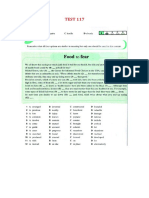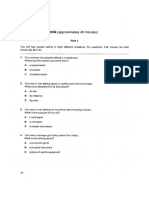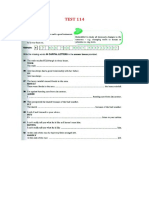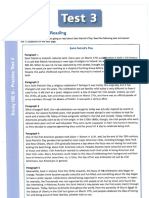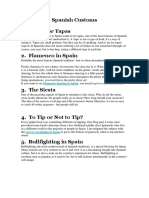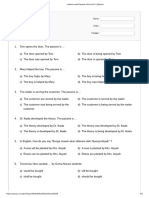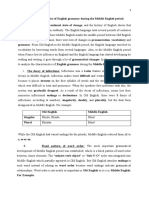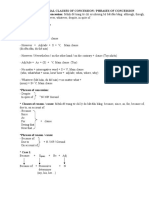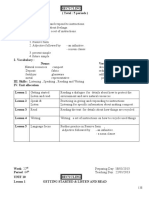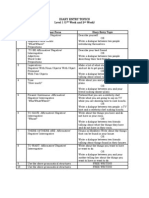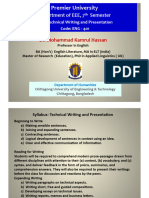0 ratings0% found this document useful (0 votes) 856 views8 pagesPresent Perf. vs. Past Simple Ex.
Ejercicios sobre Present Perfect and Past Simple. FCE. B2.
Copyright
© © All Rights Reserved
We take content rights seriously. If you suspect this is your content,
claim it here.
Available Formats
Download as PDF or read online on Scribd
Ge eae eycoe eee eau
1 Present perfect simple or past simple’
has/have + past participle ve finished.
has have not + past participle She hasw' finished,
has/have...* past participle? Have you finished?
‘Some verbs are irregular: brealk — broken; go — gone » See Appendix 2.
For past simple forms, see Unit 2, Grammar, part 1.
We use the present perfect simple:
+ with since or for, about a period of time
which is still continuing:
I've lived next door since June. (= and 1 still
live next door now)
ve lived there for four yeurs.
live there)
and | still
+ with questions asking how long:
How long have you lived here
you still live here)
‘A Sometimes we can use also use the
present perfect continuous.
See Grammar, part 2.
© for unfinished actions and events, often
with still or yer:
I still haven't finished it
I haven'e finished it yet.
‘A, Still and yet are always used with a
negative in the present perfect. (Still goes
before the verb and yet goes after it)
+ for events repeated over a period of time
until the present (they may continue):
You've played the saxophone every night.
(< until now, and you will probably
continue to play every night)
© for events which happened in the past at a
time which is unknown and /or irrelevant:
Tve started my essay. (= we don’t know.
when)
Ive lost my new camera.
important when or where)
t's not
We use the past simple:
+ with for, about a period of time which is
finished:
1 lived there for four years. (= but Idon’t
live there now)
+ with questions asking when:
When did you move here? (= the move is in
the past)
+ for completed actions and events in the
past, often with ago
I finished it half an hour ago.
+ for events repeated over a period of time in
the past (they are now finished):
You played the saxophone every night
ut you don't any more)�We use the present perfect simple:
+ for events that happened in the recent past
(often with just):
Flight 206 has landed. (= in the last few
minutes)
She's just gone 1o the cinema, (= and she's
there now)
when the time stated is not finished
Dve spent this morning writing an essay.
its still morning)
The builders have started working on the
kitchen this week. (it’s still this week)
when we talk about a period of time up to
the present:
Pve been to Los Angeles but not to New York.
(= in my life so far ~ I may go to New York
in the future)
The team has won several matches. (= and
may win more)
when we talk about how many times
something has happened:
‘This is the first time anyone has
complained.
with adverbs like already, before, ever and
never:
Nobody's ever complained before,
now)
I've never tried Japanese food. (= but 1
might one day)
Tve already rung the restaurant.
ve met her before somewhere
A Never, ever and already go between the
auxiliary and the main verb. Before goes
after the verb.
until
atter a superlative (>see Unit 7):
Irs the best cup of coffee Pve had here.
‘We use the past simple:
+ for events that happened at a particular
time in the past:
Flight 206 landed at one o'clock.
or within a period of time in the past:
She was at the cinema between midday and
two o'clock. (= but she’s not there now)
when the time stated is finished:
I spent this morning writing an essay.
it’s now afternoon so ‘this morning’ is
n the past)
I started my essay last week,
is definitely in the past)
Tost my new camera in London.
place fixes it at a time in the past)
last week’
he
when we talk about past events which are
not connected to the present:
Twent to Los Angeles but not to New York,
(= om a particular trip which is in the past)
The Chinese invented prinsing.�Gerais el eesseiia ey
2 Present perfect simple or continuous?
has/have been + past participle
has /have not been * past part
ple
‘The pres
ve been working hard.
‘She hasn't been working hard,
has/ have .. + been + past participle? Have you been working hard?
ent perfect and the present perfect continuous are both used to
describe events or activities which started in the past and have continued
up to the present, or activities which stopped recently. Some verbs can be
used in either the present perfect simple or continuous
Tittle
difference in meaning. These are verbs which describe activities which
normally happen over a period of time, e.g. live, study, learn, wait, work:
Martin has lived /has heen living in Australia for five years,
We use the present perfect continuous:
© to talk about how long something has been
happening:
Tve been driving since five o'clock this
morning.
‘The children have been playing happily
all morning.
We've been worrying about her all week
How long have you been watching TV?
to focus on the activity or event itself
(whether it is complete or not is
unimportant):
He's been reading she newspapers while he
was waiting for her. (= we're interested in
how he passed the time ~ not if he read
every page)
I've been mending the car.
I'm dirty)
= that’s why
We use the present perfect simple:
+ to talk about how often or how many times
something has happened:
I've driven there several times before.
‘The children have played four games of
tennis this morning.
Tve worried about her every day since
she set off
I've watched three programmes.
to focus on the results of an activity or
event which is complete:
I've read the newspapers. (= ve finished
reading them)
I've mended the car. (= I've just finished so
we can go out in it now)
A We never use the present tense to talk about how long we have been
doing something:
Pve been learning the piano for a long time.
(not Hiearning te piane fora tongrime),
State verbs are not usually used in the present perfect continuous (> see
Unit 1):
I've nown her since she was four years old. (not Fee-heen-knewing hex...)�|
~)
vir)
C /Grammar exercises
Match these sentence halves.
1 He's talked to her on the phone... a for years.
2 This summer the pool was only open ...___b_on my way home from work yesterday.
3 The whole team felt exhausted .. ¢ since nine o'clock this morning.
4 The rent of my flat has gone up when the match finished.
5 She's had nothing to eat ~ € ever since she was very young.
6 I got very wet... £ by 20 per cent this year.
7 spent a month in Brazil ... g a few minutes ago,
8 She's always enjoyed painting ... h from April till September.
9 Thaven’t had such a good time iin 1992,
10 The post arrived j every night this week.
BD) Fil in the gaps with the present perfect or the past simple of the verbs in brackets.
1 This is only the second time Lv¢..cvet..flewn. (ever fly) in an aeroplane.
2 The child a. (sleep) from seven till seven without waking once.
3 Gabriella ...... (grow) five centimetres since last month.
BD -» (Send) Ed three emails last week but he
(not reply) to any of them yet.
5 swunsunsnnnnnn (YOU Tearn) to play chess when you were a child?
61. 7 (buy) this bicycle five years ago and T — (use)
it every day since then
7 How long eoeoneennnnnnnne (YOU have) that bad cough?
8 The train ' ou (just arrive), so hurry and you might catch it.
ovvevwnen (never see) such a beautiful rainbow before.
~ (dream) about a beautiful desert island last night.
11 On Sunday we ....... a (meet) outside the cinema as usual.
D2 When eee eennennnen (yet get) that jacket? Teen (not notice)
it before.
20�ese ey
1 Fitlin the gaps with a suitable verb in the present perfect or the past simple.
Dear Lewis,
TGR. nanan (1) here in Spain for two weeks now and
Tim having a ceally good time. MEN Tenens @ at
the ak POCt To eonnmennnmnnnnnnn (3) very lonely, But I
cwweninnnnn lceady) (4) some frends and Tim staying
with a ceally rice family. They ~ (5) me 40 the.
seaside lat weekend and we smn (6) i the sea.
Tay nn sia (AY) Hines celina Bio (B)) asa
Spanish bot T mmsnnnnnmnmnnn (ef (9) to ary language
chsses yet - inex start next week. E's new midnigtt and
need to go to bed AS Tees (10) 2 very busy
Mayet ates om (11) SS
shopping this morning and T
: tet) |
| tennis ‘this aFtemaon.
lorrte: back soon.
Al the best,
Renae
[Read this conversation between two people in a sports club. Underline the most
suitable form of the verbs.
‘Anna: Excuse me. We've waited /We've heen waiting (1) to play tennis since 10.30.
It must be our turn now. How long have you played /have you been playing (2)?
Tim: Since about 9.30. We've played!/ We've been playing (3) two matches so far this
morning and we haven’ finished / we haven't been finishing (4) the third yet.
You'll have to wait or do something else. Have you tried / Have you been
srying (5) the swimming pool?
Anna: We don’t want to swim, we want to play tennis, You've played / You've heen
playing (6) for more than two hours and it’s our turn. We're tired of waiting
and we haven't got anything to do, We've read/ We've been reading (7) the
magazines we brought with us.
Tira: I said you'll have to wait. I always play on a Saturday morning. Anyway, we've
already started /we've already been starting (8) the third match.
Anna: Oh well, it looks like we've got no choice, but we've booked /we've been booking (9)
the court for next Saturday so you'll be unlucky then,
21
a�Reading
You are going to read a newspaper article about a news presenter called Katie Derham.
Choose from the sentences A-H the one which best summarises each part (1-6) of
the article. There is one extra sentence which you do not need to use.
She decided she was not talented enough for one particular career.
Other people do not realise what her job is really like.
She is likely to do well despite some mistakes.
She does not accept how famous she really is.
‘The range of skilis she has acquired are an advantage in her present job.
She recognises which skills she needs to develop.
‘There is no truth in some of the reports we read.
She does not consider herself to be ambitious,
rommooar�Katie’s
TEC
success
Present perfect and past simple
3
And stories of fights amongst the news girls are
denied: There are so many channels, news programmes
and air time that there is plenty of space for everyone.
There have always been these kinds of rumours. You
get to know a lot of presenters but I've found the
others are a support to me ~ at least they understand
the kind of pressures which come with the job!
4
When Katie Derham went to Cambridge University to
study economics, she fell in love with the place. was
so much enjoying my luck at being in such a beautiful
place that while I was there I didn’t think further than
that and that’s still the way I am. T enjoy what’s'on
offer at the moment. People dor't believe me, asa lot
of media people 1 work with have had to push very
hard to get where they are, but Tve been lucky. When
T left Cambridge I didn't betieve life could be better’
a
But it has got better and continues to do so. Katie
Desham is 28 and she is the new face of television
‘news bulletins on ITN. The regular news presenter
finished last year. Katie took over from her and has
read the news five nights a week since then. She has
survived reports of a couple of stips when she misread
some news items and the media interest in her points
to a bright future.
Katie has just moved into a flat near Regent's Park in
London. She is a keen musician and is looking forward
to getting her piano into the flat so she can start
playing again. There was even a brief moment when
she considered trying to make a career out of her
piano playing, but she says realism intervened: ‘T
think you should know what your limitations are. 1
was adequate but never brilliant?
5
During college Katie considered many ‘serious’
professions such as management consultancy and
accountancy but journalism was always at the back of
her mind although she knew no journalists and had
very little knoviledge of the profession. Eventually she
got a job as a secretary at a radio station. She went
fon to produce and present a range of radio
programmes and started to get noticed. She currently
combines being ITWs arts and media correspondent
with newsreading and brings a solid journalistic
background to the job.
[2]
S|
But Katie does not really take the media interest
seriously. Becoming so visible has taken some getting
used to, but she does not feel it imposes on her tife,
despite being recognised on the street. It has not
gone to her head and her response is typically modest:
‘Think people more often think they were at school
with me or they've sean me before in the supermarket
serving cheese or somethin
For the mament, Katie loves her job despite not
getting home until nearly midnight some days. ‘I ty
to persuade my friends to have parties which start at
midnight! However often I tell them, they don't take
‘n the reality of what’ involved in a media job. They
Just see me on the screen for a few minutes. But I
dont mind missing out - I waulé be delighted if I was
still doing this in a couple of years’ time’�Gemeaceees
This is an extract from the text. Without looking back at the text, fill in
the gaps with the present perfect simple or the past simple of the verbs
in the box.
be fall finish get go have to
not believe notthink read take
When Katie Detham sioe-li2itnne (1) to Cambridge University to study
economies, She enssnssnnnmaninnn (2) in love with the place. I was so much.
enjoying my luck at being in such a beautiful place that while T was there I
ssid (3) further than that and that’s still the way I am. I enjoy
what's on offer at the moment. People don't believe me, as a lot of media
people I work with vue (4) push very hard to get where they
Fe, DUET non ~~ (8) lucky. When I left Cambridge
Teste ~» (6) life could be better?) But it a a
better and continues to do so. Katie Detham is 28 and she is the new face of
television news bulletins on ITN. The regular news presenter
(8) last year. Katie wwe .. (9) over from her
coonen (10) the news five nights a week since then,
and






